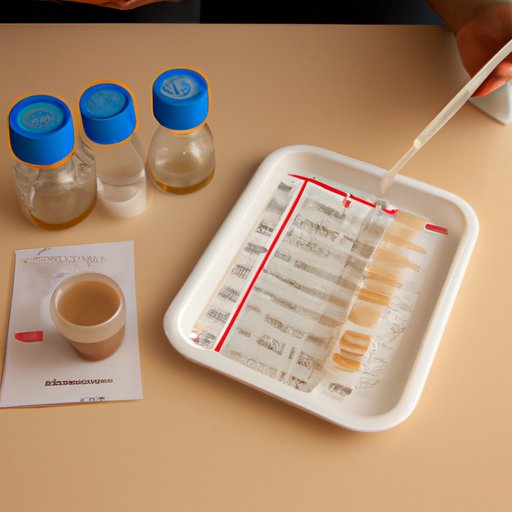Introduction
A stool culture test is a commonly used diagnostic tool that helps to identify potential medical issues in the gastrointestinal (GI) tract. It is a laboratory analysis of a sample of stool, or feces, that can be used to detect a variety of health conditions, including infections, malabsorption, malignancy, and other medical disorders. The results of a stool culture test can provide valuable information to healthcare providers and help them diagnose and treat underlying medical conditions.

Overview of What a Stool Culture Test is and What it Tests For
Stool culture tests are performed to detect the presence of bacteria, parasites, or viruses in the GI tract. These tests help to identify the cause of various digestive symptoms and can also be used to monitor treatment effectiveness. A stool culture test may include a bacterial culture, a parasite test, or a Salmonella test. Depending on the type of test being performed, the sample may be examined for the presence of certain bacteria, parasites, or viruses.
Benefits of Getting a Stool Culture Test
A stool culture test can provide a wealth of information about the health of the GI tract. It can help to identify the cause of digestive symptoms such as abdominal pain, diarrhea, and nausea. It can also help to detect the presence of infection-causing organisms, such as bacteria, parasites, and viruses. Additionally, a stool culture test can be used to monitor the effectiveness of treatments for various GI conditions.
Different Types of Stool Culture Tests
There are several different types of stool culture tests that can be used to detect the presence of specific organisms in the GI tract. These tests include:
Bacterial Culture
A bacterial culture is a type of stool culture test that detects the presence of bacteria in the stool sample. This test can be used to identify the presence of both pathogenic and non-pathogenic bacteria. Commonly tested bacteria include E. coli, Salmonella, Shigella, Campylobacter, and Clostridium difficile.
Parasite Tests
A parasite test is another type of stool culture test that looks for the presence of parasites in the sample. This test can be used to detect the presence of Giardia, Cryptosporidium, Entamoeba histolytica, and other parasitic organisms. It can also be used to identify the presence of helminth eggs, which are the eggs of worms such as tapeworms and pinworms.
Salmonella Tests
A Salmonella test is a type of stool culture test that is used to detect the presence of Salmonella bacteria in the sample. This test can be used to identify the presence of Salmonella typhi, which is the bacteria responsible for causing typhoid fever. It can also be used to detect other strains of Salmonella, such as Salmonella enteritidis, which is responsible for food poisoning.

Procedure for Doing a Stool Culture Test
The procedure for doing a stool culture test is relatively simple and straightforward. First, a sample of stool must be collected. This can be done at home or in a doctor’s office. Once the sample has been collected, it must be transported to a laboratory for processing. In the laboratory, the sample is processed and analyzed for the presence of bacteria, parasites, and/or viruses.

Health Conditions Detected Through a Stool Culture Test
A stool culture test can be used to detect a variety of health conditions. It can be used to diagnose infections, such as bacterial or viral gastroenteritis, as well as inflammatory bowel diseases, such as Crohn’s disease and ulcerative colitis. Additionally, it can be used to detect the presence of colon cancer and other gastrointestinal malignancies.
Accuracy of Stool Culture Tests
Stool culture tests are generally considered to be accurate and reliable. However, there are certain factors that can affect the accuracy of the results. For example, if the sample is not collected properly or if it is transported improperly, the results may be inaccurate. Additionally, improper handling or processing of the sample can affect the accuracy of the results.
In addition to these external factors, the accuracy of the results may also be affected by the sensitivity of the test. Different tests have different levels of sensitivity, meaning that some tests may be more accurate than others. According to a study published in the journal Clinical Microbiology Reviews, “the accuracy of a given test depends on the sensitivity and specificity of the test as well as the prevalence of the target organism in the population under study.”
Conclusion
A stool culture test is a common diagnostic tool used to detect health conditions such as intestinal infections, inflammatory bowel disease, and colon cancer. Different types of stool culture tests can be used to detect the presence of bacteria, parasites, and viruses in the GI tract. The procedure for doing a stool culture test is relatively simple and straightforward. The accuracy of the results may be affected by certain factors, such as the sensitivity of the test and the proper collection and transportation of the sample. Overall, a stool culture test is a valuable diagnostic tool that can provide valuable insight into the health of the GI tract.
(Note: Is this article not meeting your expectations? Do you have knowledge or insights to share? Unlock new opportunities and expand your reach by joining our authors team. Click Registration to join us and share your expertise with our readers.)
